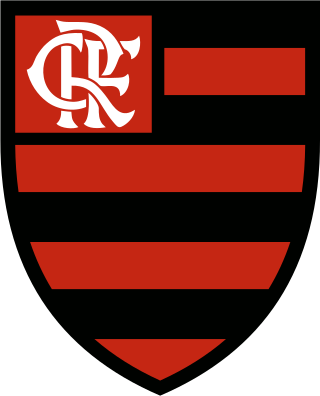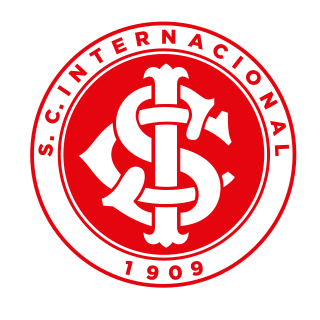
The 1950 FIFA World Cup was the fourth edition of the FIFA World Cup, the quadrennial international football championship for senior men's national teams and held in Brazil from 24 June to 16 July 1950. It was the first World Cup tournament in over twelve years, as the 1942 and 1946 World Cups were cancelled due to World War II. Uruguay, who had won the inaugural competition in 1930, defeated the host nation, Brazil, in the deciding match of the four-team group of the final round. This was the only tournament not decided by a one-match final. It was also the inaugural tournament where the trophy was referred to as the Jules Rimet Cup, to mark the 25th anniversary of Jules Rimet's presidency of FIFA.

Clube de Regatas do Flamengo, more commonly referred to as simply Flamengo, is a Brazilian sports club based in Rio de Janeiro, in the neighborhood of Gávea, best known for their professional football team that plays in Campeonato Brasileiro Série A, as well as Campeonato Carioca.

Sport Club Corinthians Paulista, commonly referred to as Corinthians, is a Brazilian professional sports club based in São Paulo, in the district of Tatuapé. Although competing in multiple sports modalities, it is best known for its professional men's football team, which plays in the Campeonato Brasileiro Série A,, the top tier of Brazilian football, as well as in the Campeonato Paulista Série A1, the first division of the traditional in-state competition.

Sport Club Internacional, commonly known as Internacional, Inter de Porto Alegre or simply Inter, is a Brazilian professional football club based in Porto Alegre. They play in the Série A, the first division of the Brazilian league, as well as in Campeonato Gaúcho Série A, the first level of the Rio Grande do Sul state football league. The team's home stadium, known as Estádio Beira-Rio ("Riverside"), was one of the twelve 2014 FIFA World Cup venues and has a capacity of 50,128.

Sports in Brazil are those that are widely practiced and popular in the country, as well as others which originated there or have some cultural significance. Brazilians are heavily involved in sports. Football is the most popular sport in Brazil. Other than football, sports like volleyball, mixed martial arts, basketball, tennis, and motor sports, especially Formula One, enjoy high levels of popularity. Great players like Neymar have devoted their life to sports and became a celebrity.

The Peru national rugby team, nicknamed los Tumis, is an emerging team in the Americas and a member of the Confederación Sudamericana de Rugby (Consur).

The 2000 FIFA Club World Championship was the inaugural FIFA Club World Cup, the world club championship for men's club association football teams. It took place in Brazil from 5 to 14 January 2000. FIFA as football's international governing body selected Brazil as the host nation on 8 June 1999 as the bid was found to be the strongest among four candidates. The draw was made at the Copacabana Palace in Rio de Janeiro on 14 October 1999. All matches were played in either Rio de Janeiro's Estádio do Maracanã or São Paulo's Estádio do Morumbi.

Rugby union in the United States is played at youth, high school, college, amateur, professional, and international levels and governed by USA Rugby. There were over 125,000 players registered with USA Rugby as of 2016. Over 2,500 rugby union clubs exist around the country, including those who are part of college rugby. Professional club competition has existed as Major League Rugby (MLR) since 2017.

The Brazil national rugby union team, nicknamed Tupis, is controlled by the Brazilian Rugby Confederation. Brazil is one of the founding unions of CONSUR and played in the inaugural South American tournament. Brazil has not qualified for a Rugby World Cup, but participated in the first edition of rugby 7s in the Olympics. Brazil currently ranks 4th in South America and 6th in the Americas region.

Rugby union in Argentina is a hugely popular team sport. The first rugby match played in the country dates back to 1873, as the game was introduced by the British. The Argentina national team, sometimes referred to as the Pumas, have competed at the Rugby World Cup, and are considered a tier one nation by the sport's governing body, World Rugby.
Elba de Pádua Lima, best known by the nickname Tim, was a Brazilian footballer and coach.

The Copa Rio was the first intercontinental club football tournament with teams from Europe and South America, having been held on two occasions, in 1951 and 1952, in Brazil. Both editions were organised and endorsed by the Brazilian Sports Confederation, the then Brazilian FA and sports main body. The tournament is often regarded in Brazil as an official tournament, at least as far as the Brazilian clubs are concerned. The name Copa Rio, Portuguese for Rio Cup, was a homage to Rio de Janeiro City. The 1951 edition of the competition was also hailed as "Club World Cup" or "World Champions Cup" by the Brazilian FA and press. Though some previous club competitions may have been hailed as "the club world contest", Copa Rio was the first attempt at creating a Club World Cup with intercontinental reach.

Rugby union in Peru is a minor but growing sport.
Wilson Francisco Alves - also known as Wilson only - was a Brazilian football player and manager. The defender had his greatest successes with CR Vasco da Gama in the 1940s and 1950s, a club then known as Expresso da Vitória. With the Brazil national team he won a South American Championship. A highlight of his coaching years was the winning of a State Championship of Paraná. He was a great Brazilian footballer.

Waldyr Pereira, also known as Didi, was a Brazilian footballer who played as a midfielder or as a forward. He played in three FIFA World Cups, winning the latter two.
Cricket is a growing sport in Brazil, presently in nascent stages. Interest in the sport dates back earlier than 1860, which saw the establishment of the country's first official cricket ground, but it wasn't until 2003 that Brazil became a member of the International Cricket Council and emerged onto the world stage. Since then, cricket has become increasingly popular among native Brazilians, with the formation of a women's team and several junior competitions.

Martim Francisco Ribeiro de Andrada was a Brazilian association football coach. He is widely credited with the invention of the 4–2–4 formation when guiding his first club, the Villa Nova AC of Nova Lima, to the State Championship of Minas Gerais in 1951. He won further state championships with Atlético Mineiro of Belo Horizonte in 1953, CR Vasco da Gama of Rio de Janeiro in 1956 and SE Gama of Brasília in 1979. Other clubs he coached include Corinthians, Cruzeiro, America FC of Rio de Janeiro and Athletic Bilbao in Spain. With Bangu AC he won the State Champions' Cup of 1967.
British football clubs tours over South America contributed to the spread and develop of football in the region during the first years of the 20th century. The first club to tour on the region was Southampton F.C. in 1904, followed by several teams until 1929 with Chelsea F.C. being the last team to tour.
The 2018 South American Rugby League Championship will be held in São Paulo, Brazil and is going to be held on the 23rd to the 25th of November 2018. The tournament is the inaugural South American Championship. The teams participating in the tournament are Brazil, Argentina and Colombia. The South American Cup also includes a women's international between the Brazilian women's team and Argentinian women's team and a second division game between Brazil and Argentina, as well as an Under-17's match between Brazil and Argentina.

The São Paulo state football team represents São Paulo in association football.
















